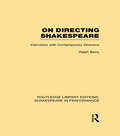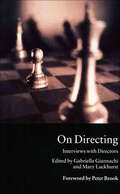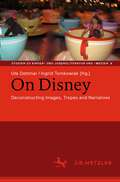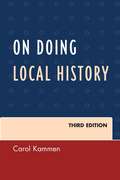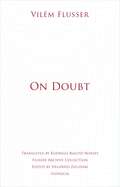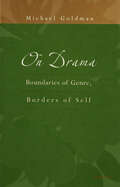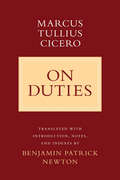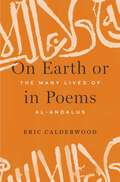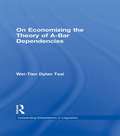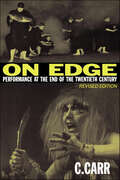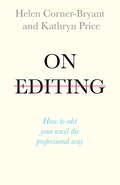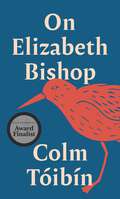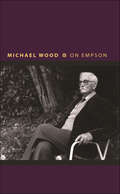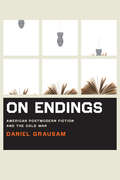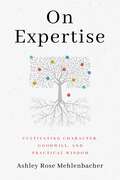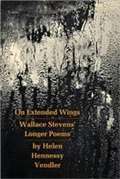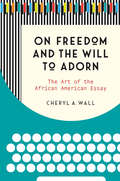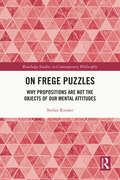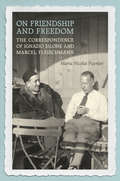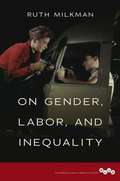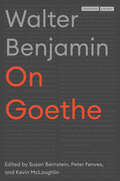- Table View
- List View
On Directing Shakespeare (Routledge Library Editions: Shakespeare in Performance)
by Ralph BerryFor producers and directors planning a production, several questions inevitably arise: Which play is appropriate for the contemporary audience? Should the text and setting be altered? Twelve leading contemporary directors answer these questions in interviews in this book and shed light on what Shakespeare means to them and to their audiences. Originally published in 1977.
On Directing: Interviews with Directors
by Gabriella Giannachi and Mary LuckhurstThe profession of directing is barely a century old. On Directing considers the position of the director in theater and performance today. What is a director? How do they begin work on a play or performance? What methods are used in rehearsal? Is the director an enabler, a collaborator or dictator? As we enter the new millennium, is the very concept of directing under increasing threat from changes in thinking and practice? The full diversity of today's approaches to directing are explored through a series of interviews with leading contemporary practitioners. On Directing is a landmark book about the director's craft.
On Disney: Deconstructing Images, Tropes and Narratives (Studien zu Kinder- und Jugendliteratur und -medien #9)
by Ute Dettmar Ingrid TomkowiakDisney – This name stands not only for a company that has had global reach from its early days, but also for a successful aesthetic programme and ideological positions that have had great commercial success but at the same time have been frequently criticised. Straddling traditionalism and modernism, Disney productions have proven adaptable to social discourses and technical and media developments throughout its history. This volume brings together scholars from several European countries to explore various dimensions that constitute ‘Disney.’ In line with current media and cultural studies research, the chapters deal with human-human and human-animal relations, gender and diversity, iconic characters and narratives, Disney’s contribution to cultural and visual heritage, and transmedial and transfictional spaces of experience and practices of participation associated with Disney story worlds.
On Doing Local History (American Association for State and Local History Series)
by Carol KammenFor over thirty years, Carol Kammen’s On Doing Local History has been a valuable guide to professional and “amateur” historians alike. <p><p>First published in 1986, revised in 2003, this book offers not only discussion of practical matters, but also a deeper reflection on local, public history, what it means, and why it is done. It is used in classrooms and found on the shelves of local historians across the U.S.
On Doubt (Univocal)
by Vilém FlusserIn On Doubt, Vilém Flusser refines Martin Heidegger&’s famous declaration that &“language is the dwelling of Being.&” For Flusser, &“the word is the dwelling of being,&” because in fact, in the beginning, there was the word. On Doubt is a treatise on the human intellect, its relation to language, and the reality-forming discourses that subsequently emerge. For Flusser, the faith that the modern age places in Cartesian doubt plays a role similar to the one that faith in God played in previous eras—a faith that needs to be challenged. Descartes doubts the world through his proposition cogito ergo sum, but leaves doubt itself untouched as indubitable and imperious. His cogito ergo sum may have proved to the Western intellect that thoughts exist, but it did not prove the existence of that which thinks: one can eliminate thinking and yet continue being. Therefore, should we not doubt doubt itself? Should we not try to go beyond this last step of Cartesian doubt and look for a new faith? The twentieth century has seen many attempts to defeat Cartesian doubt, however, this doubt of doubt has instead generated a complete loss of faith, which the West experiences as existential nihilism. Hence, the emergent emptying of values that results from such extreme doubt. Everything loses its meaning. Can this climate be overcome? Will the West survive the modern age?
On Drama: Boundaries of Genre, Borders of Self (Theater: Theory/Text/Performance)
by Michael GoldmanThe latest book by noted critic and scholar Michael Goldman provides fresh and unexpected insights into the role played by genre in the experience of drama. Challenging the view that genre is by definition exclusion, and that its policing of boundaries is out of place in the neighborhood of art, Michael Goldman suggests that the lens of genre can provide keen insights for our understanding and appreciation of drama. For Goldman, it is important to consider drama as an exper-ience, an ongoing moment-to-moment process for audiences or readers. Everything changes, says Goldman, when we stop to think of genre as not entirely unlike rhyme or ambiguity--features whose primary interest for readers or audiences is as something that happens to us in a poem or play, as it happens. It is valuable to see that--as it operates in drama--the instability of the subject of genre has a specific and unique texture, one that can offer useful insights into our experience as viewers of and participants in drama. In this light, discussions of genre can help us to understand what drama as a special kind of social practice does for and with our lives. It is important that we work toward understanding the process of thinking about drama in this light--that we understand the power and complexity of drama--and Michael Goldman aims to do so in this book. Michael Goldman is Professor of English, Princeton University. He is author of a number of books, including Acting and Action in Shakespearean Tragedy, Shakespeare and the Energies of Drama, Ibsen: The Dramaturgy of Fear, and The Actor's Freedom: Toward a Theory of Drama.
On Duties
by Marcus Tullius Cicero Benjamin Patrick NewtonBenjamin Patrick Newton's translation of Cicero's On Duties is the most complete edition of a text that has been considered a source of moral authority throughout classical, medieval, and modern times. Marcus Tullius Cicero was a preeminent Roman statesman, orator, and philosopher who introduced philosophy into Rome, and through Rome, into Christendom and the modern world. On Duties was championed by important thinkers including Thomas Aquinas, Montesquieu, and Voltaire, and it was one of the earliest books printed on the Gutenberg press.The true significance of On Duties lies in its examination of several fundamental problems of political philosophy, the most important being the possible conflict between the honorable and the useful. The honorable encompasses the virtues of human beings, which include justice and concern for the common good. The useful refers to the needs of living beings, which includes certain necessities and concern for private good. Only by understanding the possible conflict between these two sides of human nature, Cicero declares, may we understand our duties to our community and to ourselves. This new edition of On Duties aims to provide readers who cannot read Latin but wish to study the book with a literal yet elegant translation. It features an introduction, outline, footnotes, interpretative essay, glossary, and indexes, making Cicero's thought accessible to a general audience.
On Earth or in Poems: The Many Lives of al-Andalus
by Eric Calderwood“With extraordinary linguistic range, Calderwood brings us the voices of Arabs and Muslims who have turned to the distant past of Spain to imagine their future.”—Hussein Fancy, Yale UniversityHow the memory of Muslim Iberia shapes art and politics from New York and Cordoba to Cairo and the West Bank.During the Middle Ages, the Iberian Peninsula was home not to Spain and Portugal but rather to al-Andalus. Ruled by a succession of Islamic dynasties, al-Andalus came to be a shorthand for a legendary place where people from the Middle East, North Africa, and Europe; Jews, Christians, and Muslims lived together in peace. That reputation is not entirely deserved, yet, as On Earth or in Poems shows, it has had an enduring hold on the imagination, especially for Arab and Muslim artists and thinkers in Europe, the Middle East, and North Africa.From the vast and complex story behind the name al-Andalus, Syrians and North Africans draw their own connections to history’s ruling dynasties. Palestinians can imagine themselves as “Moriscos,” descended from Spanish Muslims forced to hide their identities. A Palestinian flamenco musician in Chicago, no less than a Saudi women’s rights activist, can take inspiration from al-Andalus. These diverse relationships to the same past may be imagined, but the present-day communities and future visions those relationships foster are real.Where do these notions of al-Andalus come from? How do they translate into aspiration and action? Eric Calderwood traces the role of al-Andalus in music and in debates about Arab and Berber identities, Arab and Muslim feminisms, the politics of Palestine and Israel, and immigration and multiculturalism in Europe. The Palestinian poet Mahmud Darwish once asked, “Was al-Andalus / Here or there? On earth … or in poems?” The artists and activists showcased in this book answer: it was there, it is here, and it will be.
On Economizing the Theory of A-Bar Dependencies (Outstanding Dissertations in Linguistics)
by Wei-Tien Dylan TsaiFirst Published in 1999. Routledge is an imprint of Taylor & Francis, an informa company.
On Edge: Performance at the End of the Twentieth Century
by Cynthia CarrThrough her engaged and articulate essays in the Village Voice, C. Carr has emerged as the cultural historian of the New York underground and the foremost critic of performance art. On Edge brings together her writings to offer a detailed and insightful history of this vibrant brand of theatre from the late 70s to today. It represents both Carr's analysis as a critic and her testament as a witness to performances which, by their very nature, can never be repeated.Carr has organized this collection both chronologically and thematically, ranging from the emphasis on bodily manipulation/endurance in the 70s to the underground club scene in New York to an insider's analysis of the Tompkins Square Riot as a manifestation of the cultural and social conflicts that underlie much of performance art. She examines the transgressive and taboo-shattering work of Ethyl Eichelberger, Karen Finley, and Holly Hughes; documents specific performances by Annie Sprinkle and Lydia Lunch; and maps the development of such artists as Robbie McCauley, Blue Man Group, and John Jesurun. She also describes the "cross-over" phenomenon of the mid-80s and considers the far-right backlash against this mainstreaming as cultural reactionaries sought to curb the influence of these new artists.CONTRIBUTORS: Linda Montano, Chris Burden, G.G Allin, Jean Baudrillard, Patty Hearts, Dan Quayle, Anne Magnouson, John Jesurun, John Kelly, Shu Lea Changvv, Diamanda Galas, Salley May, Rafael Mantanez Ortiz, Sherman Fleming, Kristine Stiles, Laurie Carlos, Jessica Hafedorn, Robbie McCormick, Karen Finley, Poopo Shiraishi, Donna Henes, Holey Hughe, Ela Troyano, Michael Smith, Harry Koipper, John Sex, Nina Jagen, Ethyl Eichelberge, Marina Abramovic, Ulay.
On Editing: How to edit your novel the professional way
by Helen Corner-Bryant Kathryn PriceWriting is a magical hobby and form of expression but getting words on the page is not the same as finalising material which you are happy to send out and share. This book is a complete toolkit which will help you to tame doubts and insecurities and engage with your internal critic in order to assert control over your manuscript and elevate your writing.Written by the team behind one of the world's most successful literary consultancies, On Editing will show you how to master the art of self-editing - perhaps the least understood but most vital skill in the writer's toolkit. You will learn to compose, draft and edit while sharpening your writing and ensuring that your novel is structurally sound, authentic, well-written and ready for submission.ABOUT THE SERIESThe Teach Yourself Creative Writing series helps aspiring authors tell their stories. Covering a range of genres from science fiction and romantic novels to illustrated children's books and comedy, this series is packed with advice, exercises, and tips for unlocking creativity and improving your writing. And because we know how daunting the blank page can be, we set up the Just Write online community, at tyjustwrite.com, for budding authors and successful writers to connect and share.
On Editing: How to edit your novel the professional way
by Helen Corner-Bryant Kathryn Price"Highly recommended: On Editing is indispensable reading for anyone who is or wants to be a writer. Every desk should have a copy!"- Dr Samantha J. Rayner, Director of the Centre for Publishing, UCL"On Editing is a feast with many courses. When you have finished this book, you will feel encouraged, empowered, and indomitable. If you are writing-or editing-a novel, you could do no better than to have this book by your side. Comprehensive, easily digestible, it is a classic in the making." - Shaye Areheart, Director of the Columbia Publishing CourseWriting a novel is a magical but often difficult journey; and when your first draft is complete, that journey's not over. As the editing process gets underway, authors often find themselves in unfamiliar territory. What does it mean to 'map your plot'? How do you know if you're 'head-hopping'? When is your novel ready to send out to agents, and how do you make each submission count? Written by the team behind one of the world's most successful literary consultancies, On Editing will show you how to master the self-edit. You will learn to compose, draft, and edit while sharpening your writing and ensuring that your novel is structurally sound, authentic, well-written, and ready for submission.On Editing will help you harness your creative potential, transform the way you think about your writing, and revolutionise your editorial process."It's easy for writers to be overwhelmed by the technicalities of writing, editing and getting published, but Helen Corner-Bryant and Kathryn Price share their decades of experience nurturing writers in On Editing. They know all the problems and how to fix them - including many you might not even think of - and explain it all in a clean, jargon-free, way that demystifies the whole process, with infectious enthusiasm that will have you ready, eager and bursting with the confidence to take your writing to the next level." - Writing Magazine
On Elizabeth Bishop (Writers on Writers)
by Colm TóibínA compelling portrait of a beloved poet from one of today's most acclaimed novelistsIn this book, novelist Colm Tóibín offers a deeply personal introduction to the work and life of one of his most important literary influences—the American poet Elizabeth Bishop. Ranging across her poetry, prose, letters, and biography, Tóibín creates a vivid picture of Bishop while also revealing how her work has helped shape his sensibility as a novelist and how her experiences of loss and exile resonate with his own. What emerges is a compelling double portrait that will intrigue readers interested in both Bishop and Tóibín.For Tóibín, the secret of Bishop's emotional power is in what she leaves unsaid. Exploring Bishop&’s famous attention to detail, Tóibín describes how Bishop is able to convey great emotion indirectly, through precise descriptions of particular settings, objects, and events. He examines how Bishop&’s attachment to the Nova Scotia of her childhood, despite her later life in Key West and Brazil, is related to her early loss of her parents—and how this connection finds echoes in Tóibín&’s life as an Irish writer who has lived in Barcelona, New York, and elsewhere.Beautifully written and skillfully blending biography, literary appreciation, and descriptions of Tóibín&’s travels to Bishop&’s Nova Scotia, Key West, and Brazil, On Elizabeth Bishop provides a fresh and memorable look at a beloved poet even as it gives us a window into the mind of one of today&’s most acclaimed novelists.
On Empson (Writers on Writers)
by Michael WoodFrom one of today's most distinguished critics, a beautifully written exploration of one of the twentieth century's most important literary criticsAre literary critics writers? As Michael Wood says, "Not all critics are writers—perhaps most of them are not—and some of them are better when they don't try to be." The British critic and poet William Empson (1906–84), one of the most important and influential critics of the twentieth century, was an exception—a critic who was not only a writer but also a great one. In this brief book, Wood, himself one of the most gifted writers among contemporary critics, explores Empson as a writer, a distinguished poet whose criticism is a brilliant literary performance—and proof that the act of reading can be an unforgettable adventure.Drawing out the singularity and strength of Empson's writing, including its unfailing wit, Wood traces the connections between Empson's poetry and criticism from his first and best-known critical works, Seven Types of Ambiguity and Some Versions of Pastoral, to later books such as Milton's God and The Structure of Complex Words. Wood shows why this pioneer of close reading was both more and less than the inventor of New Criticism—more because he was the greatest English critic since Coleridge, and didn't belong to any school; and less because he had severe differences with many contemporary critics, especially those who dismissed the importance of an author's intentions.Beautifully written and rich with insight, On Empson is an elegant introduction to a unique writer for whom literature was a nonstop form of living.
On Endings: American Postmodern Fiction and the Cold War
by Daniel GrausamWhat does narrative look like when the possibility of an expansive future has been called into question? This query is the driving force behind Daniel Grausam's On Endings, which seeks to show how the core texts of American postmodernism are a response to the geopolitical dynamics of the Cold War and especially to the new potential for total nuclear conflict. Postwar American fiction needs to be rethought, he argues, by highlighting postmodern experimentation as a mode of profound historical consciousness. In Grausam's view, previous studies of fiction mimetically concerned with nuclear conflict neither engage the problems that total war might pose to narration nor take seriously the paradox of a war that narrative can never actually describe. Those few critical works that do take seriously such problems do not offer a broad account of American postmodernism. And recent work on postmodernism has offered no comprehensive historical account of the part played by nuclear weapons in the emergence of new forms of temporal and historical experience. On Endings significantly extends the project of historicizing postmodernism while returning the nuclear to a central place in the study of the Cold War.
On Expertise: Cultivating Character, Goodwill, and Practical Wisdom (RSA Series in Transdisciplinary Rhetoric #17)
by Ashley Rose MehlenbacherThere is a deep distrust of experts in America today. Influenced by populist politics, many question or downright ignore the recommendations of scientists, scholars, and others with specialized training. It appears that expertise, a critical component of democratic life, no longer appeals to wide swaths of the body politic. On Expertise is a robust defense of the expert class. Ashley Rose Mehlenbacher examines modern and ancient theories of expertise through the lens of rhetoric and interviews some forty professionals, revealing how they understand their own expertise and how they came to be known as "experts." She shows that expertise requires not only knowledge and skill but also, crucially, an acknowledgment by others—both specialists and laypeople—that one is a credible authority. At its heart, expertise is a rhetorical construct, and to be persuasive, experts must have the ability to apply their knowledge and skills rightly—in the right way, at the right time, to achieve the right end. Ultimately, Mehlenbacher argues that experts apply their technical knowledge effectively and win others’ trust through acting prudently and cultivating goodwill. Timely, practical, and sophisticated, On Expertise provides vital scaffolding for our understanding of expertise and its real-world application. This book is essential for beginning the work of rehabilitating the expert class amid a politics of extreme populism and anti-intellectualism.
On Expertise: Cultivating Character, Goodwill, and Practical Wisdom (RSA Series in Transdisciplinary Rhetoric)
by Ashley Rose MehlenbacherThere is a deep distrust of experts in America today. Influenced by populist politics, many question or downright ignore the recommendations of scientists, scholars, and others with specialized training. It appears that expertise, a critical component of democratic life, no longer appeals to wide swaths of the body politic. On Expertise is a robust defense of the expert class. Ashley Rose Mehlenbacher examines modern and ancient theories of expertise through the lens of rhetoric and interviews some forty professionals, revealing how they understand their own expertise and how they came to be known as “experts.” She shows that expertise requires not only knowledge and skill but also, crucially, an acknowledgment by others—both specialists and laypeople—that one is a credible authority. At its heart, expertise is a rhetorical construct, and to be persuasive, experts must have the ability to apply their knowledge and skills rightly—in the right way, at the right time, to achieve the right end. Ultimately, Mehlenbacher argues that experts apply their technical knowledge effectively and win others’ trust through acting prudently and cultivating goodwill. Timely, practical, and sophisticated, On Expertise provides vital scaffolding for our understanding of expertise and its real-world application. This book is essential for beginning the work of rehabilitating the expert class amid a politics of extreme populism and anti-intellectualism.
On Extended Wings: Wallace Stevens' Longer Poems
by Helen H. VendlerThough Wallace Stevens' shorter poems are perhaps his best known, his longer poems, Helen Hennessy Vendler suggests in this book, deserve equal fame and equal consideration. Stevens' central theme-the worth of the imagination-remained with him all his life, and Mrs. Vendler therefore proposes that his development as a poet can best be seen, not in description-which must be repetitive-of the abstract bases of his work, but rather in a view of his changing styles. The author presents here a chronological account of fourteen longer poems that span a thirty-year period, showing, through Stevens' experiments in genre, diction, syntax, voice, imagery, and meter, the inventive variety of Stevens' work in long forms, and providing at the same time a coherent reading of these difficult poems. She concludes, "Stevens was engaged in constant experimentation all his life in an attempt to find the appropriate vehicle for his expansive consciousness; he found it in his later long poems, which surpass in value the rest of his work. "
On Faulkner: The Best from American Literature
by Louis J. Budd Edwin H. CadyFrom 1929 to the latest issue, American Literature has been the foremost journal expressing the findings of those who study our national literature. The journal has published the best work of literary historians, critics, and bibliographers, ranging from the founders of the discipline to the best current critics and researchers. The longevity of this excellence lends a special distinction to the articles in American Literature.Presented in order of their first appearance, the articles in each volume constitute a revealing record of developing insights and important shifts of critical emphasis. Each article has opened a fresh line of inquiry, established a fresh perspective on a familiar topic, or settled a question that engaged the interest of experts.
On Freedom and the Will to Adorn: The Art of the African American Essay
by Cheryl A. WallAlthough they have written in various genres, African American writers as notable and diverse as W. E. B. Du Bois, James Baldwin, and Alice Walker have done their most influential work in the essay form. The Souls of Black Folk, The Fire Next Time, and In Search of Our Mothers' Gardens are landmarks in African American literary history. Many other writers, such as Ralph Ellison, Zora Neale Hurston, James Weldon Johnson, and Richard Wright, are acclaimed essayists but achieved greater fame for their work in other genres; their essay work is often overlooked or studied only in the contexts of their better-known works. Here Cheryl A. Wall offers the first sustained study of the African American essay as a distinct literary genre. Beginning with the sermons, orations, and writing of nineteenth-century men and women like Frederick Douglass who laid the foundation for the African American essay, Wall examines the genre's evolution through the Harlem Renaissance. She then turns her attention to four writers she regards as among the most influential essayists of the twentieth century: Baldwin, Ellison, June Jordan, and Alice Walker. She closes the book with a discussion of the status of the essay in the twenty-first century as it shifts its medium from print to digital in the hands of writers like Ta-Nehisi Coates and Brittney Cooper. Wall's beautifully written and insightful book is nothing less than a redefinition of how we understand the genres of African American literature.
On Frege Puzzles: Why Propositions Are Not the Objects of Our Mental Attitudes (Routledge Studies in Contemporary Philosophy)
by Stefan RinnerThis book argues against the received view of propositional theory, according to which mental attitudes—such as believing, knowing, hoping, and wishing—are relations held between agents and propositions.Roughly speaking, propositions are primary bearers of truth that are neither sentences nor utterances of sentences, be it of a public language or of a language of thought. This book argues that the propositional theory does not provide a solution to Frege’s puzzle about belief, which arises if we formulate disquotational principles connecting sincere assertion and belief, certain standards regarding rationality, and semantic principles such as the theory of direct reference within the framework of the propositional theory. This suggests that we must reject the propositional theory. The book emphasises this again by showing that the propositional theory cannot solve Schiffer's puzzle regarding de re belief, which, in addition to disquotational principles connecting sincere assertion and belief, uses highly plausible exportation and rationality principles for de re belief. It then discusses possible alternatives to the propositional theory, such as Marcus’ theory of states of affairs, Lewis’ property account, Larson and Ludlow’s theory of interpreted logical forms, and Moltmann’s Multiple Relation Theory. Just like the propositional theory, these theories maintain that mental attitudes such as believing are relations, and they also inherit the main problems of the propositional theory. Therefore, the author proposes and develops a non-relational account of the attitudes in question that together with a measurement account of the respective attitude ascriptions, provides a solution to both Frege’s puzzle and Schiffer’s puzzle.On Frege Puzzles will appeal to scholars and graduate students working in philosophy of language, philosophy of mind, and logic.
On Friendship and Freedom: The Ignazio- Marcel Fleischmann Correspondence
by Maria Nicolai PaynterIgnazio Silone, the anti-fascist, Italian author and political activist, continues to intrigue readers and stimulate their minds nearly four decades after his death. On Friendship and Freedom contains the first published collection of correspondence between Silone and his longtime friend the philanthropist and art collector Marcel Fleischmann. Maria Nicolai Paynter, a recognized authority on Silone and his work, deftly guides the reader through the years dominated by Fascism and Nazism as well as the decades leading up to Silone's death in 1978. Of particular interest for its human value, the correspondence gathered in this volume is most inspiring in that it reveals how two men of different cultural and religious backgrounds join together and share true friendship against all odds.
On Frost: The Best from American Literature
by Louis J. Budd Edwin H. CadyFrom 1929 to the latest issue, American Literature has been the foremost journal expressing the findings of those who study our national literature. The jouranl has published the best work of literary historians, critics, and bibliographers, ranging from the founders of the discipline to the best current critics and researchers. The longevity of this excellence lends a special distinction to the articles in American Literature.Presented in order of their first appearance, the articles in each volume constitute a revealing record of developing insights and important shifts of critical emphasis. Each article has opened a fresh line of inquiry, established a fresh perspective on a familiar topic, or settled a question that engaged the interest of experts.
On Gender, Labor, and Inequality
by Ruth MilkmanRuth Milkman's groundbreaking research in women's labor history has contributed important perspectives on work and unionism in the United States. On Gender, Labor, and Inequality presents four decades of Milkman's essential writings, tracing the parallel evolutions of her ideas and the field she helped define. Milkman's introduction frames a career-spanning scholarly project: her interrogation of historical and contemporary intersections of class and gender inequalities in the workplace, and the efforts to challenge those inequalities. Early chapters focus on her pioneering work on women's labor during the Great Depression and the World War II years. In the book's second half, Milkman turns to the past fifty years, a period that saw a dramatic decline in gender inequality even as growing class imbalances created greater-than-ever class disparity among women. She concludes with a previously unpublished essay comparing the impact of the Great Depression and the Great Recession on women workers.
On Goethe (Cultural Memory in the Present)
by Walter BenjaminOn Goethe contains the full range of Walter Benjamin's reflections on the central figure in modern German culture. The writings in this volume—newly translated, fully annotated, and framed by an extensive introduction—display a variety of styles and cover a vast array of topics. The collection revolves around two strikingly different essays. Whereas "Goethe's Elective Affinities" develops a theory of critique in which a work is illuminated wholly from within itself, an article Benjamin wrote on Goethe for the Soviet Encyclopedia represents his first large-scale attempt to elaborate a historical-materialist methodology. The other thirty translations stand in similarly productive tension with one another. Some are concerned with concepts of beauty and categories of the aesthetic, others with the relation of art to politics and the status of "classical authors" in contemporary culture, and still others with what remains of humanistic traditions in the wake of their disappearance under fascist regimes and what synthesis is required for the construction of a historical object. The volume provides a glimpse into the laboratory of Benjamin's thought, while granting readers a series of insights into the epochal phenomena that gather around the name "Goethe."
